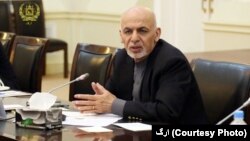The Afghan government has asked the United Nations to include the Taliban's fugitive chief in its blacklist of individuals under travel and financial bans and arms embargo.
The move, critics say, demonstrates hardening of President Ashraf Ghani's stance about engaging the Taliban in peace talks, and it will likely fuel the insurgency.
The Taliban has long demanded, among other things, removal of names of its senior leaders from the U.N. sanctions list before it decides to engage in peace talks with Kabul.
"We want the U.N. to add names of terrorists, including Taliban leader Mullah Hibatullah, to its sanctions list," an official statement quoted Ghani as telling a delegation of the U.N. sanctions committee in Kabul.
The U.N. team of experts is visiting the country to review and help in the efforts aimed at promoting Afghan peace and stability.
Warning of bloodshed
A former Taliban member, Akbar Agha, has warned that Hibatullah's inclusion in the U.N. sanctions list will mean more bloodshed and will prolong the Afghan war.
"Both the government and the Taliban need to take steps that pave the way for a peace dialogue between them rather than complicate and prolong the war," Agha told VOA.
The Taliban has expanded and intensified insurgent activities across Afghanistan, particularly since Hibatullah was named its supreme leader after a U.S. drone strike killed his predecessor, Mullah Akthar Mansoor, in May this year.
The government is in control of 258 of the 407 Afghan districts, while the insurgent group controls 33 and 116 districts are "contested," according to a U.S. military assessment contained in the latest quarterly report by the Special Inspector General for Afghanistan Reconstruction or SIGAR.
Taliban attacks
Afghan forces continue to struggle to contain the Taliban attacks, and have lost more than 5,500 personnel while about 10,000 have been wounded in the first eight months of this year.
Within the past week, the Islamist insurgency has carried out two spectacular attacks on foreign targets. On Saturday, a Taliban suicide bomber blew himself up inside the U.S.-run Bagram military base, north of Kabul.
The blast killed four Americans and wounded 16 others. A day earlier, the insurgents stormed the German consulate in the northern city of Mazar-i-Sharif, detonating an explosives-packed vehicle to remove obstacles in their way.
At least six people were killed and 130 were wounded in that attack, though all German and Afghan staff at the diplomatic facility escaped unhurt.
The U.N delegation has also assured Ghani it will help in taking off the names of Gulbuddin Hekmatyar and other commanders of his insurgent Hezb-i-Islamic faction from the sanctions list.
The notorious warlord has recently struck a peace deal with the government to quit violence in return for lifting of U.N. sanctions on him to allow him to return to Afghan politics from years of hiding.


